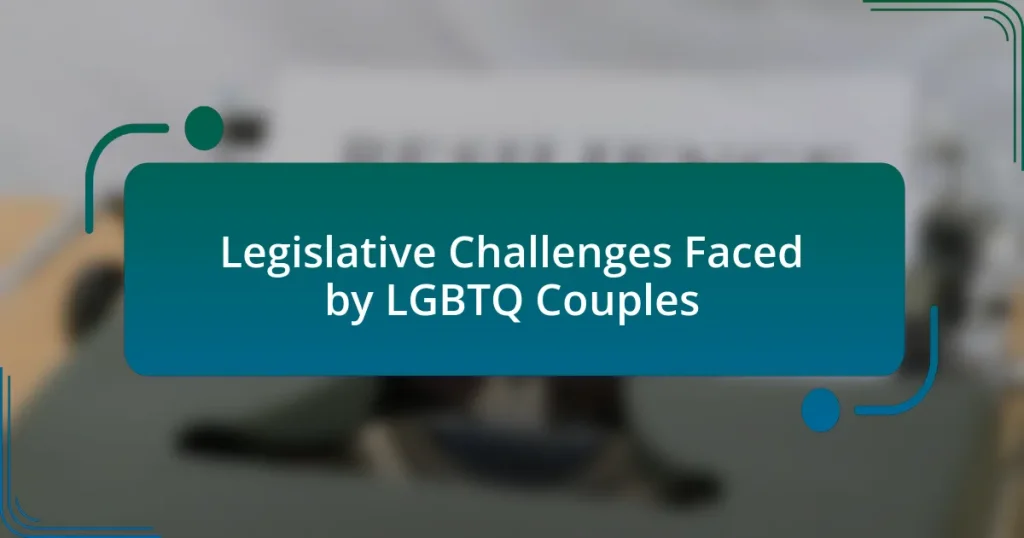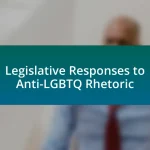The article examines the legislative challenges faced by LGBTQ couples, highlighting issues such as the lack of federal protections against discrimination, varying state laws on marriage and adoption, and limitations in healthcare access. It discusses how legal rights differ across regions, the impact of marriage equality on LGBTQ families, and the role of anti-discrimination laws in safeguarding their rights. Additionally, the article explores historical contexts, landmark legal cases, and current legislative trends that affect LGBTQ couples, emphasizing the ongoing struggle for equality and the importance of advocacy for stronger protections.
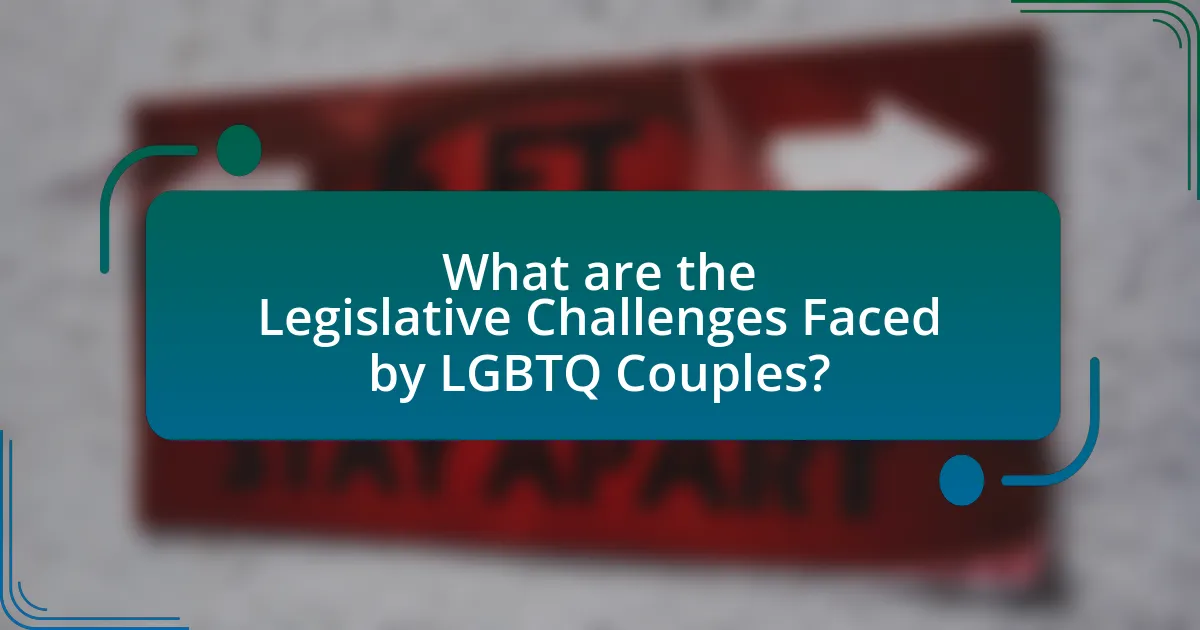
What are the Legislative Challenges Faced by LGBTQ Couples?
LGBTQ couples face significant legislative challenges, including the lack of federal protections against discrimination, varying state laws regarding marriage and adoption, and limitations on healthcare access. For instance, while the Supreme Court legalized same-sex marriage nationwide in 2015, many states still have laws that can discriminate against LGBTQ individuals in areas such as employment and housing. Additionally, some states have enacted laws that restrict adoption rights for same-sex couples, creating barriers to family formation. According to a 2021 report by the Human Rights Campaign, 29 states lack comprehensive non-discrimination protections for LGBTQ individuals, highlighting the ongoing legislative hurdles they encounter.
How do laws vary for LGBTQ couples across different regions?
Laws for LGBTQ couples vary significantly across different regions, reflecting a spectrum of legal recognition and rights. In countries like Canada and many Western European nations, same-sex marriage is legal, and LGBTQ couples enjoy comprehensive legal protections, including adoption rights and anti-discrimination laws. Conversely, in regions such as parts of Africa and the Middle East, LGBTQ relationships are criminalized, with severe penalties for same-sex activities, and no legal recognition for couples. For example, in Uganda, same-sex relationships can lead to life imprisonment, while in Saudi Arabia, they can result in capital punishment. This stark contrast illustrates the global disparity in legal frameworks affecting LGBTQ couples, influenced by cultural, religious, and political factors.
What specific legal rights are often denied to LGBTQ couples?
LGBTQ couples often face denial of specific legal rights such as adoption rights, spousal benefits, and healthcare decision-making authority. Adoption rights can be restricted in certain jurisdictions, preventing LGBTQ couples from legally adopting children or facing additional hurdles compared to heterosexual couples. Spousal benefits, including tax benefits, inheritance rights, and access to family health insurance plans, may not be equally available, particularly in states without comprehensive anti-discrimination laws. Additionally, healthcare decision-making authority can be denied, leaving partners vulnerable in medical emergencies if they are not recognized as legal next of kin. These disparities highlight ongoing legislative challenges that LGBTQ couples encounter in securing equal rights under the law.
How do state and federal laws interact regarding LGBTQ rights?
State and federal laws interact regarding LGBTQ rights through a complex relationship where federal laws set minimum standards that states can build upon or, in some cases, undermine. For instance, the federal ruling in Obergefell v. Hodges (2015) established the constitutional right to same-sex marriage, which states must recognize; however, some states have enacted laws that limit protections for LGBTQ individuals, such as religious exemptions that allow discrimination. This dynamic creates a patchwork of rights across the country, where federal protections may be challenged or expanded by state legislation, leading to ongoing legal disputes and varying levels of rights and protections for LGBTQ individuals depending on their state of residence.
Why is marriage equality a significant issue for LGBTQ couples?
Marriage equality is a significant issue for LGBTQ couples because it ensures legal recognition of their relationships, granting them the same rights and protections as heterosexual couples. Without marriage equality, LGBTQ couples face disparities in areas such as healthcare, taxation, inheritance, and parental rights. For instance, a 2020 study by the Williams Institute found that states with marriage equality laws saw a 7% increase in mental health among LGBTQ individuals, highlighting the positive impact of legal recognition on their well-being. Furthermore, marriage equality addresses systemic discrimination, fostering social acceptance and equality under the law.
What legal benefits do married LGBTQ couples receive compared to unmarried couples?
Married LGBTQ couples receive numerous legal benefits compared to unmarried couples, including tax advantages, inheritance rights, and access to spousal benefits. For instance, married couples can file joint tax returns, which may result in lower tax liabilities, while unmarried couples do not have this option. Additionally, married couples automatically inherit each other’s assets without the need for a will, whereas unmarried partners may face legal hurdles in inheritance matters. Furthermore, married LGBTQ couples are eligible for spousal benefits such as health insurance and Social Security, which are not available to unmarried couples. These legal benefits are reinforced by the Supreme Court’s ruling in Obergefell v. Hodges (2015), which legalized same-sex marriage nationwide, ensuring equal rights and protections for married LGBTQ couples.
How does the lack of marriage equality impact LGBTQ families?
The lack of marriage equality significantly impacts LGBTQ families by denying them legal recognition and the associated rights that heterosexual couples enjoy. This absence of legal status leads to challenges in areas such as healthcare, inheritance, and taxation, where LGBTQ families may face discrimination or lack access to benefits. For instance, a study by the Williams Institute found that same-sex couples without marriage rights are more likely to experience economic instability, as they cannot access spousal benefits like health insurance or tax breaks. Additionally, children in LGBTQ families may face legal uncertainties regarding custody and parental rights, further complicating their stability and security.
What role do anti-discrimination laws play in protecting LGBTQ couples?
Anti-discrimination laws play a crucial role in protecting LGBTQ couples by prohibiting discrimination based on sexual orientation and gender identity in various areas such as employment, housing, and public accommodations. These laws ensure that LGBTQ couples have equal access to services and opportunities, thereby promoting their rights and dignity. For instance, the U.S. Supreme Court’s decision in Bostock v. Clayton County (2020) confirmed that Title VII of the Civil Rights Act protects employees from discrimination based on sexual orientation or gender identity, reinforcing the legal framework that safeguards LGBTQ individuals in the workplace. Such legal protections are essential for fostering an inclusive society where LGBTQ couples can live without fear of discrimination or bias.
What are the limitations of current anti-discrimination laws for LGBTQ couples?
Current anti-discrimination laws for LGBTQ couples are limited by gaps in coverage, inconsistent enforcement, and lack of comprehensive federal protections. Many states do not have laws explicitly prohibiting discrimination based on sexual orientation or gender identity, leaving LGBTQ couples vulnerable in areas such as housing, employment, and public accommodations. For example, as of 2023, 29 states lack explicit protections against discrimination based on sexual orientation, and 31 states lack protections based on gender identity. Additionally, existing laws often rely on state-level interpretations, leading to varied enforcement and legal outcomes across jurisdictions. This inconsistency can result in unequal treatment and uncertainty for LGBTQ couples seeking legal recourse.
How can LGBTQ couples advocate for stronger protections?
LGBTQ couples can advocate for stronger protections by actively engaging in legislative processes, such as contacting lawmakers, participating in public hearings, and joining advocacy organizations. By mobilizing their communities and sharing personal stories, they can highlight the need for specific legal protections, such as anti-discrimination laws and marriage equality. Research shows that personal narratives can significantly influence public opinion and legislative outcomes, as evidenced by the increased support for LGBTQ rights following high-profile cases and advocacy campaigns.
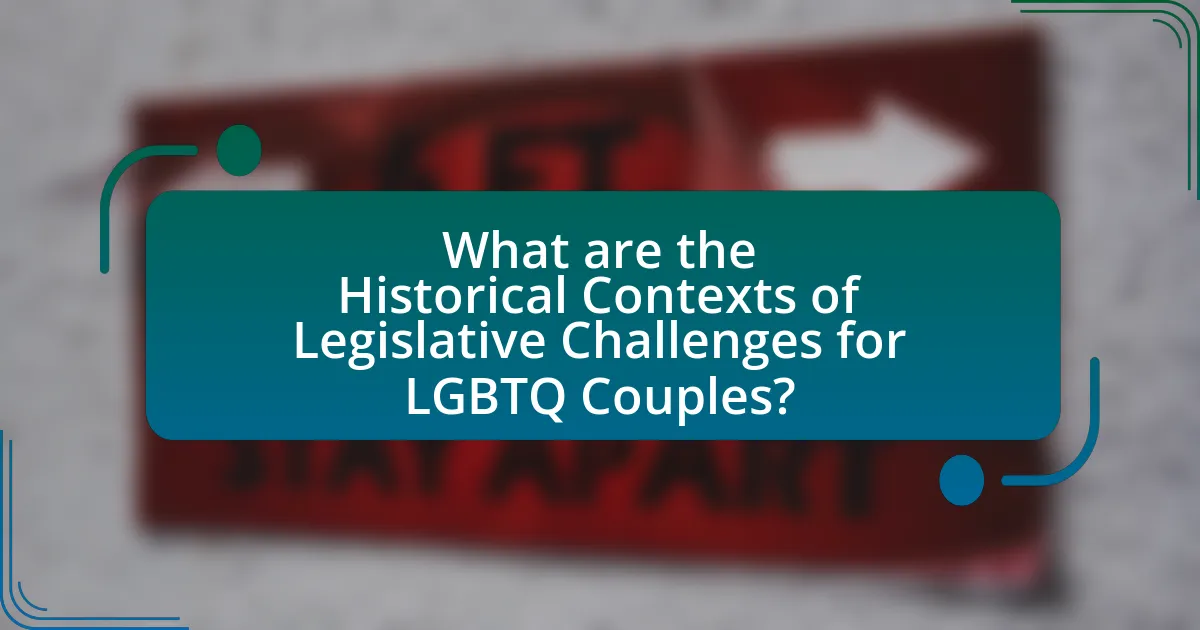
What are the Historical Contexts of Legislative Challenges for LGBTQ Couples?
The historical contexts of legislative challenges for LGBTQ couples include a long-standing pattern of discrimination and exclusion from legal recognition and rights. For instance, prior to the 1970s, same-sex relationships were criminalized in many jurisdictions, which severely limited the ability of LGBTQ couples to access legal protections. The landmark case of Obergefell v. Hodges in 2015, which legalized same-sex marriage nationwide in the United States, marked a significant turning point, yet it followed decades of legal battles and social movements advocating for LGBTQ rights. Additionally, the Defense of Marriage Act (DOMA) enacted in 1996, which defined marriage as between one man and one woman, exemplified the legislative barriers that LGBTQ couples faced. These historical contexts illustrate the ongoing struggle for equality and the impact of legislation on the rights of LGBTQ couples.
How have past legal battles shaped the current landscape for LGBTQ rights?
Past legal battles have significantly shaped the current landscape for LGBTQ rights by establishing crucial precedents and protections. Landmark cases such as Obergefell v. Hodges in 2015 legalized same-sex marriage nationwide, affirming the constitutional right to marry for same-sex couples. Additionally, cases like Lawrence v. Texas in 2003 decriminalized same-sex sexual activity, dismantling laws that criminalized LGBTQ relationships. These rulings have not only expanded legal recognition but also fostered societal acceptance, influencing subsequent legislation aimed at protecting LGBTQ individuals from discrimination in various sectors, including employment and housing. The cumulative effect of these legal victories has created a more robust framework for LGBTQ rights, promoting equality and challenging discriminatory practices.
What landmark cases have influenced LGBTQ legislation?
Landmark cases that have influenced LGBTQ legislation include Obergefell v. Hodges, Lawrence v. Texas, and United States v. Windsor. Obergefell v. Hodges (2015) established the constitutional right to same-sex marriage, ruling that state bans on same-sex marriage violated the Fourteenth Amendment. Lawrence v. Texas (2003) invalidated sodomy laws, affirming the right to private sexual conduct between consenting adults, which was a significant step towards decriminalizing LGBTQ relationships. United States v. Windsor (2013) struck down the Defense of Marriage Act, allowing federal recognition of same-sex marriages and paving the way for broader marriage equality. These cases collectively advanced LGBTQ rights and reshaped the legal landscape regarding marriage and personal freedoms.
How has public opinion shifted regarding LGBTQ rights over time?
Public opinion regarding LGBTQ rights has shifted significantly over time, moving from widespread opposition to increasing acceptance. In the 1970s, only about 26% of Americans supported same-sex marriage, according to a Gallup poll. By 2015, following the Supreme Court’s decision in Obergefell v. Hodges, which legalized same-sex marriage nationwide, support had surged to approximately 60%. This shift reflects broader societal changes, including increased visibility of LGBTQ individuals and advocacy efforts, as well as generational changes in attitudes, with younger demographics showing higher levels of acceptance.
What historical events have highlighted the need for legislative change?
The Stonewall Riots of 1969 highlighted the need for legislative change regarding LGBTQ rights in the United States. This pivotal event marked a turning point in the fight against discrimination, as it galvanized the LGBTQ community to demand equal rights and protections under the law. Following the riots, advocacy efforts led to significant legislative changes, including the decriminalization of homosexuality in many states and the eventual legalization of same-sex marriage in 2015 through the Supreme Court case Obergefell v. Hodges. These events underscore the ongoing struggle for legislative reform to address the rights and protections of LGBTQ individuals.
How did the AIDS crisis impact LGBTQ legal advocacy?
The AIDS crisis significantly accelerated LGBTQ legal advocacy by highlighting the urgent need for legal protections and healthcare rights for the community. As the epidemic disproportionately affected gay men and marginalized individuals, it galvanized activists to push for changes in laws regarding healthcare access, inheritance rights, and anti-discrimination protections. For instance, the formation of organizations like ACT UP in the 1980s focused on demanding government action and legal reforms, which led to increased visibility of LGBTQ issues in legislative discussions. This activism resulted in landmark legal advancements, such as the eventual recognition of same-sex partnerships and the establishment of policies aimed at protecting LGBTQ individuals from discrimination in healthcare and employment.
What role did the Stonewall Riots play in LGBTQ rights movements?
The Stonewall Riots served as a catalyst for the modern LGBTQ rights movement, igniting activism and advocacy for equal rights. Occurring in June 1969, the riots were a response to police raids at the Stonewall Inn in New York City, which were emblematic of systemic discrimination against LGBTQ individuals. The events galvanized the community, leading to the formation of organizations such as the Gay Liberation Front and the first Pride marches, which aimed to promote visibility and fight for legal rights. The riots marked a significant shift in public perception and political engagement, ultimately contributing to legislative changes, including the decriminalization of homosexuality in various jurisdictions and the push for anti-discrimination laws.
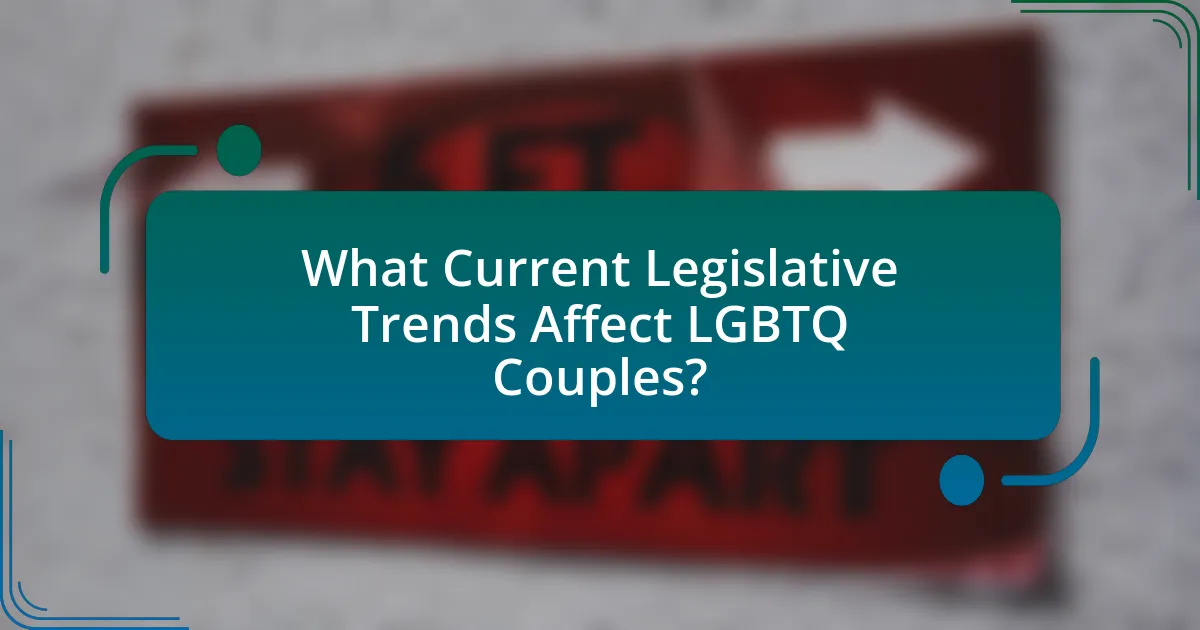
What Current Legislative Trends Affect LGBTQ Couples?
Current legislative trends affecting LGBTQ couples include the introduction of laws that either protect or restrict their rights, particularly in areas such as marriage equality, adoption, and anti-discrimination. For instance, several states have enacted laws that explicitly protect LGBTQ individuals from discrimination in employment and housing, reflecting a growing recognition of their rights. Conversely, some states have passed legislation that limits the ability of LGBTQ couples to adopt children or access reproductive health services, indicating a backlash against previous advancements. According to the Human Rights Campaign, as of 2023, over 300 anti-LGBTQ bills have been introduced in various state legislatures, highlighting the contentious nature of these legislative trends.
How are recent legislative changes impacting LGBTQ couples today?
Recent legislative changes are positively impacting LGBTQ couples by enhancing their legal rights and protections. For instance, the legalization of same-sex marriage in various countries has granted LGBTQ couples access to the same legal benefits as heterosexual couples, including tax benefits, inheritance rights, and healthcare decision-making. Additionally, anti-discrimination laws have been enacted in several jurisdictions, providing LGBTQ couples with protections in employment, housing, and public accommodations. According to a 2021 report by the Williams Institute, states that have implemented such protections have seen a decrease in discrimination complaints, indicating a more supportive environment for LGBTQ couples.
What new laws have been enacted to support LGBTQ rights?
Recent laws enacted to support LGBTQ rights include the Equality Act, which aims to prohibit discrimination based on sexual orientation and gender identity in various areas such as employment, housing, and public accommodations. This legislation builds upon existing civil rights laws and seeks to provide comprehensive protections for LGBTQ individuals across the United States. Additionally, several states have passed laws to protect transgender individuals’ rights, including access to healthcare and participation in sports. These legislative measures reflect a growing recognition of LGBTQ rights as fundamental human rights, addressing historical inequalities and promoting inclusivity.
How are some states rolling back protections for LGBTQ couples?
Some states are rolling back protections for LGBTQ couples by enacting legislation that undermines marriage equality and anti-discrimination laws. For example, states like Texas and Florida have introduced bills that allow businesses to refuse services based on religious beliefs, which can directly impact LGBTQ couples seeking equal treatment. Additionally, some states have passed laws that limit the ability of same-sex couples to adopt children or access fertility treatments, further eroding their rights. These legislative actions reflect a broader trend of increasing challenges to LGBTQ rights at the state level, as evidenced by the growing number of bills targeting these protections across the United States.
What are the implications of proposed legislation for LGBTQ couples?
Proposed legislation for LGBTQ couples can significantly impact their legal rights and social recognition. For instance, laws that expand marriage rights or anti-discrimination protections can enhance legal security and social acceptance for LGBTQ couples. Conversely, legislation that seeks to limit these rights, such as bills aimed at restricting marriage equality or adoption rights, can lead to increased marginalization and legal vulnerabilities. Historical data shows that states with inclusive policies report higher levels of mental well-being among LGBTQ individuals, indicating that supportive legislation fosters a healthier environment for these couples.
How can LGBTQ couples stay informed about legislative changes?
LGBTQ couples can stay informed about legislative changes by subscribing to reputable LGBTQ advocacy organizations’ newsletters and following their social media channels. Organizations such as the Human Rights Campaign and GLAAD regularly provide updates on relevant legislation, policy changes, and advocacy efforts. Additionally, utilizing legal resources like the American Civil Liberties Union can offer insights into ongoing legal battles and protections affecting LGBTQ rights. According to a 2021 report by the Movement Advancement Project, staying connected with these organizations is crucial for understanding the evolving legal landscape and ensuring that LGBTQ couples are aware of their rights and protections.
What strategies can LGBTQ couples use to advocate for their rights?
LGBTQ couples can advocate for their rights by engaging in grassroots activism, participating in legal challenges, and forming coalitions with supportive organizations. Grassroots activism involves mobilizing community support through protests, awareness campaigns, and social media outreach to highlight issues affecting LGBTQ rights. Legal challenges can be pursued by filing lawsuits to contest discriminatory laws or practices, as seen in landmark cases like Obergefell v. Hodges, which legalized same-sex marriage in the United States. Forming coalitions with organizations such as the Human Rights Campaign or Lambda Legal can amplify their voices and provide resources for advocacy efforts. These strategies have proven effective in advancing LGBTQ rights and addressing legislative challenges.
What practical steps can LGBTQ couples take to navigate legislative challenges?
LGBTQ couples can navigate legislative challenges by staying informed about their rights and local laws. This involves regularly reviewing updates on legislation that affects their relationship status, parental rights, and healthcare access. Engaging with local LGBTQ advocacy organizations can provide resources and support, as these groups often have legal experts who can offer guidance on navigating complex legal landscapes. Additionally, couples should consider consulting with attorneys who specialize in LGBTQ law to ensure they understand their legal options and protections. Documenting their relationship through legal means, such as marriage certificates or cohabitation agreements, can also help solidify their rights in various jurisdictions.
